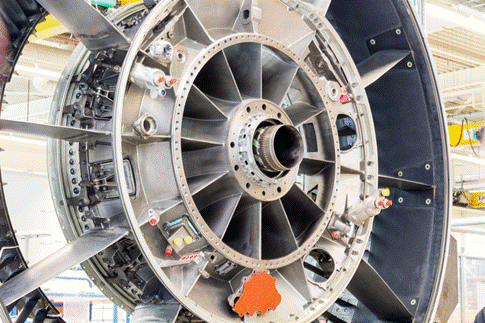The Impact of High-Quality Oil on Engine Longevity and Performance
Aug 18th 2025

High-performance engine oil or high-quality oil plays a critical role in the longevity and performance of aircraft engines, which is why it's important to always choose an oil that's designed for the type of engine in your aircraft and your environment. Engine oil acts as a lubricant, cooling agent and cleaner, ensuring smooth operation and protection against wear and tear. Choosing the right oil and adhering to regular maintenance schedules are two easy steps you can take to help maximize the life of your aircraft's engine and ensure smooth, trouble-free operation. At SkyGeek, we know a thing or two about airplane engines and in this blog post, we will explore the impact of High-performance engine oil on aircraft engine longevity and performance before tackling some frequently asked questions. Read on for a comprehensive guide to aircraft engine oil so you can have a better understanding of this important topic.
The Importance of High-Quality Oil for Aircraft Engines
High-performance engine oil plays an important role in your aircraft. It acts as a lubricant and a protectant, keeping the moving components gliding smoothly, cutting down on friction and protecting against unnecessary heat. This type of oil performs several critical functions:
1. Lubrication and Wear Protection
High-performance engine oil forms a protective film between moving engine components, reducing friction and premature wear. A good quality lubricant minimizes direct metal-to-metal contact, preventing early engine failure and extending the lifespan of critical engine parts. Almost all components in your aircraft's engine require lubrication to work and without it, parts can wear down too quickly and fail.
2. Heat Dissipation
Oil absorbs and carries away excess heat generated by engine operation. It also reduces friction, which generates heat. High-performance engine oil with good thermal stability can effectively dissipate heat, preventing overheating and maintaining optimal engine operating temperatures. By reducing friction, it also reduces the production of heat, which can cause your engine components to seize.
3. Contaminant Control
A high-performance engine oil will contain specialized additives that help control and suspend contaminants such as dirt, dust and combustion by-products. You can't avoid your engine oil becoming contaminated, but you can control how the oil reacts to those contaminants by choosing an oil with additives that are specifically designed to address this common problem. These types of additives not only encapsulate any contaminants present, it can also prevent the formation of deposits and sludge, keeping engine components clean and ensuring smooth oil flow.
4. Corrosion Prevention
Some high-performance engine oils have anti-corrosion additives that protect engine components from rust and corrosion. High-quality engine oils almost always include this type of additive as it is especially crucial for aircraft engines. Aircraft engines are particularly susceptible to corrosion because they are exposed to a wide range of environmental conditions, including high humidity and temperature variations.

Advantages of High Performance Engine Oil in Extreme Conditions
In aviation, conditions can change rapidly — from freezing temperatures at altitude to high heat during takeoff. High performance engine oil is engineered to maintain its protective properties under these extremes, resisting breakdown and maintaining lubrication even when temperatures soar. It reduces friction and protects sensitive engine components such as pistons, camshafts, and bearings from wear, ensuring smoother operation and longer service life. For operators seeking high quality engine oil that delivers reliable performance in any environment, high performance blends are the go-to choice.
Understanding the Different Types of Aviation Engine Oils
Choosing the right high performance engine oil starts with understanding the different options available for aircraft. Mineral-based oils are often recommended for new or recently overhauled engines, while synthetic oils provide superior temperature stability and wear protection, making them ideal for high-performance and extreme-condition flying. Semi-synthetic blends combine the benefits of both, offering balanced performance and cost-effectiveness. Ashless dispersant oils help prevent sludge and deposits, while turbine engine oils are engineered to handle the unique demands of jet-powered aircraft. Selecting the right type ensures optimal lubrication, protection, and engine longevity.
Why Many Pilots Choose Synthetic High Performance Engine Oil
For demanding flight conditions and long-term engine health, many pilots and mechanics recommend synthetic high quality engine oil. Synthetic formulations maintain viscosity across a wider temperature range, protect critical components from extreme heat and cold, and reduce oxidation that can lead to deposits. By resisting breakdown, these oils often extend the time between oil changes, lowering maintenance frequency without sacrificing protection. For those looking to maximize efficiency and reliability, synthetic oils are a proven choice.
FAQs about High-Quality Oil and Aircraft Engine Performance
Q1: What should I look for when selecting oil for my aircraft engine?
A: When selecting oil for your aircraft's engine, consider the manufacturer's specifications and recommendations for your specific engine model. Look for high-performance engine oil that meets the required viscosity grade, additive package, and industry certifications (e.g., SAE, API, or MIL specifications). You may want to take into consideration any special additives, like corrosion preventatives.
Q2: How often should I change the oil in my aircraft engine?
A: Oil change intervals vary depending on the aircraft and engine type, as well as the oil manufacturer's recommendations. Consult the aircraft's maintenance manual or the engine manufacturer's guidelines for the recommended oil change intervals. It's important to change the engine oil at least as often as recommended by the manufacturer to prevent premature wear and unnecessary damage.
Q3: Can using low-quality oil damage my aircraft engine?
A: Yes, using low-quality or improper oil instead of high-performance engine oil can lead to accelerated wear, increased deposits, reduced lubrication efficiency and potential engine damage. It is essential to use oil that meets the required specifications and follow the recommended maintenance practices. Consult the aircraft manufacturer's guidelines for information on what type of oil to use and ensure you consistently use that type of oil.
Q4: Can I switch between different brands or types of oil?
A: Switching between different brands or types of oil should be done cautiously. It is generally recommended to use the same brand and type of oil unless approved by the engine manufacturer. Always check for compatibility and ensure the new oil meets the necessary specifications. The manufacturer of your aircraft may recommend one or more engine oil brands that are known to be compatible with the engine.
Q5: How can I monitor the oil quality in my aircraft engine?
A: Regular oil analysis is a valuable tool for monitoring oil quality and engine health. Oil analysis provides insights into wear metal levels, contaminants, and overall oil condition. An oil analysis can also help identify potential issues before they become significant problems. It is recommended to perform an oil analysis as a regular part of your routine maintenance procedures.
Conclusion
Investing in high-performance engine oil for your aircraft engine is crucial for promoting longevity and optimizing performance. Quality oil provides effective lubrication, heat dissipation, contaminant control and corrosion prevention. By selecting the right oil and adhering to recommended maintenance practices, you can ensure the health and longevity of your aircraft engine. Remember to consult the manufacturer's guidelines, perform regular oil analysis and follow recommended oil change intervals for the best results.
Checking Certifications for Your High Performance Engine Oil
Not all oils are created equal — and for aircraft engines, meeting industry standards is critical. When selecting high quality engine oil, look for certifications such as SAE (Society of Automotive Engineers), API (American Petroleum Institute), and MIL (U.S. Military) specifications. These certifications indicate the oil has been tested for performance, safety, and compatibility with aviation engines. Always consult your aircraft manufacturer’s recommendations to ensure the oil you choose meets or exceeds these standards.
